Great minds in history
This page has a selection of great minds that have been chosen to represent an historical overview of influences upon humanity, from a viewpoint rarely described. The narratives below contain a series of ideas pointing toward a transition in consciousness humanity will need to achieve in order to survive.
Where to begin?
We could start with ancient western or eastern philosophies from Plato or Buddhism, or with earlier indigenous cultures. However, I have chosen our modern time in line with Industrialisation and technology, also referred to as the Age of Enlightenment. Ancient voices of philosophy and theology reverberate today, including some remarkable modern philosophers who have also influenced our thinking, Immanuel_Kant is an example. However, this site takes us on a tour of understanding human consciousness by those who were influenced through art and science.
We shall begin with a humorous metaphor, of which many variations have existed throughout time. "If all ravens are black, therefore everything black is a raven". This parody is grammatically correct but logically incorrect and therefore a paradox demonstrating how communicating by language alone can sometimes result in incorrect understanding. Paradoxes of this type were contemplated by Euclid 300BC who created the concept of axioms described in Euclidean geometry.
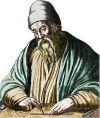
Recognising paradox in language and applying an axiomatic or geometric perspective gives us a way of understanding what may be real. From Euclidean logic we can see that there can be no such thing a single grain of sand that is the centre for all sand, nor can there exist in the universe a point which is its centre. Therefore the 'self' cannot be a centre for consciousness because a centre is an imagined geometric concept as a point with zero magnitude.
Carl Gustav Hempel in the 1940s modified the raven paradox to be both logically and grammatically correct. "If all ravens are black, therefore everything that is not black is not a raven". The ability to construct a double negative by the use of 2 not's in the same sentence to create a positive in logic may not have been comprehensible by the majority of humanity before modern times. It is these rare insights that give us an understanding about the shifts in human consciousness that have occurred since mass literacy and education. Before mass literacy, it may have been difficult for the majority of people to discern the difference between a word in language and the thing it describes.
As you scroll down this page and select names of interest, keep reading until a generalised concept appears. The summery at the end of the page will hopefully then make sense and challenge some misconceptions we have been taught about history and the nature of understanding ourselves.
Historical
(1564 - 1616) William Shakespeare

"Friends, Romans, countrymen, lend me your ears;
I come to bury Caesar, not to praise him;
the evil that men do lives after them,
the good is oft interred with their bones".
How could we not be impressed with the insightfulness of these metaphors? It would be hard not to begin with William Shakespeare possibly the greatest of all poetic writers to give insights into the human condition of drama and conflict. Humanity had and has great difficulty moving forward forever stuck in the past bound to repeat for eternity. It is from this approximate time that sufficient numbers of the population were becoming literate and mass inspiration flowed to unfold nature's secrets and investigate the human condition.
(1749 - 1832) Johann Wolfgang von Goethe

Goethe was one of the great German writers of the Enlightenment period representing humanism, liberalism and science. It was during this period that the world was being transformed from ignorance, superstition and intolerance into the modern world of today.
Goethe's scientific understanding later influenced many including Charles Darwin. However, his most renowned work was the re-writing of a German classic legend Faust, a hybrid between a play and an extended poem which is among the earliest intellectual writings of modern psycho-analytical understanding.
The Faust story is set in the Renaissance period about a hubris middle-aged alchemist, in a possible state of mid-life crisis, who makes a pack with the devil Mephistopheles. The Faust story became a basis for many later literary and musical works including Opera continuing into our modern period in films. The Oscar Wilde story ' The picture of Dorian Grey ' is an excellent example.
(1756 - 1791) Wolfgang Amadeus Mozart

In this period of great composers, Bach, Beethoven etc, Mozart was unique. Mozart is not renowned for composing music that reflected politics, nationalism, environment or religion although he could mimic every variation. Mozart masterfully wrote music that reflected the psychological experience of human emotion and feeling, particularly in the relationships we have with each other. As Mozart travelled throughout Europe he undoubtedly absorbed the passion of the great thinkers, writers and artists of this Enlightenment period.
In 1979 Peter Shaffer wrote a musical play Amadeus based on Mozart's music. The play was not intended to represent actual history, but unfortunately was criticised for not doing so. The play is centered on a character Antonio Salieri as being the patron 'Saint of Mediocrity' representing all of us born without the capacity for the musical genius Mozart appeared to effortlessly express. And from the satire of mediocrity the only criticism made of Mozart's music is that it has 'Too many notes'. The timelessness of Mozart's music has flowed on with increasing effect to each generation, particularly loved by those involved in unravelling the mystery of understanding human consciousness.
(1797 - 1851) Mary Shelley

Mary Shelley was the daughter of Mary Wollstonecraft who died a few days after Shelly was born. Wollstonecraft a feminist writer and philosopher wrote one of the earliest works on feminist philosophy ' A Vindication of the Rights of Woman ' Wollstonecraft argued that the lack of intelligence in women was not the result of a deficiency of mind but the result of social denial for women to be educated. "Taught from their infancy that beauty is woman's sceptre, the mind shapes itself to the body, and, roaming round its gilt cage, only seeks to adorn its prison".
Mary Shelley's father
William Godwin
also a philosopher, re-married a woman who behaved to Shelley as the ugly stepmother.
 Much of Shelley's life was a soap opera but she had intellectual support from many throughout her life. Mary Shelley is among the earliest female intellectual writers to express dark and complex human situations that gripped the imagination of her generation.
Much of Shelley's life was a soap opera but she had intellectual support from many throughout her life. Mary Shelley is among the earliest female intellectual writers to express dark and complex human situations that gripped the imagination of her generation.
Shelley's Frankenstein is a mythical story of a scientist with the best intentions, but blind to the un-foreseen complexities of cause and effect that result in unleashing a monster devoid of human feeling or sentiment that gets out of control. No story has more clearly represented the emotional experience of humanity overwhelmed by the on-coming of Industrialisation and technology.
(1809 - 1882) Charles Darwin
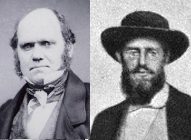
'The Origin of Species' published 1859 became the foundation of modern biology. Alfred Russel Wallace and Charles Darwin are renown for their systematic approach with scientific analysis to document evidence that demonstrated the biological evolutionary process of natural selection is always occurring. But because of political and class divisions during the Victorian era, origional authorship was only accredited to Darwin.
The concept of biological evolution had been contemplated by scientists and naturalists throughout recorded history. Many involved in agriculture and husbandry witnessed the basics of this process through cross breeding and cross-pollination. Jean-Baptiste Lamarck was one of the first to have a coherent theory of biology increasing in complexity, caused by ecological influence over long periods of time, and this earlier understanding became the foundation for Darwin and Wallace's later investigations.
Charles was born into a large family. His mother was from the Wedgewood family, his father a doctor of high social standing and intellect who also donated his time to helping the poor. Unfortunately Charles mother died 8 years after he was born. Charles later went on to study Medicine, Geology and Theology. During his early years, Charles was fortunate to meet many scientific visionaries and humanists of the time. John Edmonstone a freed black slave from South American inspired Charles when he was a teenager with visions of different lands with exotic animal and plant species. It is possible this influence also enabled Charles to clearly see race colour as being superficial, which further drove his abhorrence of slavery.

The Voyage of the Beagle, is the story of Darwin's journeys throughout the world from where the majority of evidence to scientifically prove biological evolutionary theory was obtained. The scientific evidence Charles collated placed him and all the scientific fraternity who supported this evidence in direct confrontation with those who held the religious belief that Man was created by God in His image. This unfortunately included Samuel Wilberforce an English bishop who was the son of William Wilberforce a British parliamentarian who devoted his life to the political cause of abolishing slavery.
Religious turmoil over evolutionary theory

A percentage of humanity has always been attached to various forms of religious literalism as being inclusive of their self-identity, which can be aggressively and sometimes violently defended. Why this occurs is a mystery about the limitation of human evolutionary intelligence, and hopefully the presentation of this site will unfold why this sometimes occurs.
Those of enlightened religious faith believe it is Gods will for Man to understand the world around him as a divine means to become closer with God and to achieve this objective Man's spirit must be free. But those whose identities are bound to blind faith in religious dogma believe Mans purpose is to un-questionably serve God by obeying his commandants including laws of state. Also, Man's spirit must be contained and controlled within pure thought and deed, where questioning outside of authority is heresy and therefore punishable.
The contradiction between these opposing versions of religious faith is irresolvable and cause un-necessary emotional suffering for the many people caught between the two contradictions. This problem caused by the duality of religious faith is compounded by a 3rd component added to the paradox of religious contradiction, represented by Galileo's confrontation with the church.
Galileo Galilei also believed that observing nature brings one closer to God and if people had a correct educated understanding of the world around them their behaviour would improve. Intellectuals within the church and possibly the Pope had no difficulty accepting that the earth revolved around the sun. This basic understanding had always been known to those with capacity for intellectual observation.
The churches belief was that chaos and war had always been the major problem of humanity. Therefore, the prime responsibility of the church was for keeping social order, even if this required sustaining false beliefs. History had proven that the more freedom people had to believe in anything they choose the more irresponsible and chaotically they behave. Observing modern educated people clocking up vast un-controlled amounts of credit card debt, supports Pope Urban VIII's point of view.
Thomas Huxley an advocate of Darwin was asked by Samuel Wilberforce whether he was descended from monkeys on his grandfather's side or his grandmother's side, said- "I would rather be descended from an ape than from a cultivated man who used his gifts of culture and eloquence in the service of prejudice and falsehood".
(1811 - 1896) Harriet Beecher Stowe
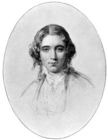
Harriet Beecher Stowe was described by Abraham Lincoln as 'The little woman who started the American civil war'. Lincoln's statement was a metaphor honouring the influence of Sotwe's novel 'Uncle Tom's Cabin' for uniting the majority of American states and much of the world to abolish slavery.
Harriet was born into a large family. Her father Lyman Beecher a humanist Protestant preacher inspired his children to achieve high intellectual standing, and many including Harriet went on to become famous in their own right.
Harriet's novel Uncle Tom's Cabin portrayed with startling clarity that all people regardless of race, class or education, equally share expressions of love, compassion, betrayal and greed. In its time, 'Uncle Tom's Cabin' achieved what Bible teaching failed to convey without interpretation, that humanity is common to all.
(1812 - 1870) Charles Dickens
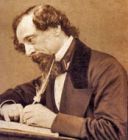
Charles Dickens was born into a moderately well off large family. But, at age 12 his father was sent to debtors' prison and Charles went to work to help support his family; working in a boot-blacking factory under shocking conditions for 10 hours a day, 6 days a week for 2 pence per hour.
Without assistance or support, he managed to achieve an education and became a law clerk and stenographer. But along with his own childhood experience he was confronted by the overwhelming social injustice and lack of compassion for the poor. Gifted with a remarkable capacity for writing social commentary he was recognised by newspapers and publishers and his career was assured.
Why are Dickens works important? It is hard for us to imagine that up until this time many of the upper classes held to beliefs that one's position in life was to do with ones blood, being of good blood or bad blood. The ancient practice of Bloodletting was still active even though William Harvey medically disproved it in 1628.
Dickens stories clearly described that a person's position in life is a result of circumstance and not of breeding. All his stories describe with irrefutable detail the social results of cause and effect on each one of us, where choice outside of being truthful and observant has little effect. Dickens stories had a profound effect on social writers, observers and intellectuals of his and including the present time, and resulted in having a large influence in inspiring others in the development of modern psychology.
(1831 - 1891) Madame Blavatsky

Madame Helena Blavatsky was born in Dnepropetrovsk, Ukraine. Her father was a colonel in the Russian army, her mother a successful novelist died when Helena was 11. Helena was described as a charismatic child with a vivid imagination that many believed was endowed with psychic powers.
Helena grew up within a culture rich in spirituality and mythology including the occult, which became the focus of her life's work. At 17, Helena rebelled against her betrothal to a middle-aged General and fled to Constantinople. Helena lived a life of perilous adventure traveling extensively to exotic regions including India, Tibet, Egypt etc, before arriving in New York in 1873.
Blurring the distinction between charlatan and spiritually gifted, coupled with her knowledge of languages and cultures made her revered and popular. Within 2 years Helena and supporters formed the Theosophical Society which became instrumental for introducing the West to the spiritual teachings of the East, especially Hinduism and Buddhism. The Theosophical Society later relocated its headquarters to Adyar, India. Theosophy
Regardless of her contradictions Madame Blavatsky influenced many including Mahatma Gandhi. However two years after she died the prediction that the Theosophical Society would be responsible for preparing the path for a new world spiritual teacher (Christ re-incarnate) unfolded with tragic demise for the society. In 1895 Jiddu Krishnamurti was born.
(1837 - 1898) John Newlands
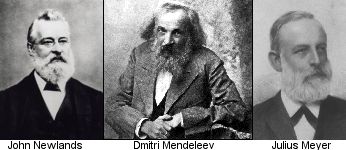
John Newlands was one of many scientists throughout the world committed to the cause of classifying the elements. Newlands was the first to create a basic table of the elements arranged in order of atomic masses. Dmitri Mendeleev and Julius Meyer developed a more sophisticated form of the table, showing greater detail enabling un-known elements to be predicted, similar to how we see it today.
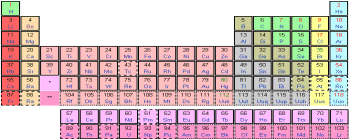
The unfolding of the periodic table is without doubt humanities greatest achievement which took vast numbers of scientific people throughout the world over 70 years to complete. Without the periodic table, our modern world of technology could not exist. Regardless of what we wish to believe, no future endeavour of humanity including the discovery of genes could possibly match this previous achievement. History of periodic table
Scientists of this time committed their lives to the betterment of humanity, influenced greatly by humanists' movements and writers including the ones listed on this page. What we see today is the stark contradiction of social attitudes 100 years later, where power status and corporate greed are the driving forces that set out to own, posses and control all new scientific discoveries. Imagine a world where the elements, oxygen, hydrogen, carbon etc being owned and controlled by corporations.
(1854 - 1900) Oscar Wilde
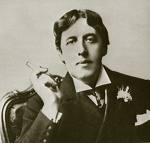
Oscar Wilde was born in Dublin, his father a doctor and socialist humanists, his mother a successful writer. Wilde became one of the great literary geniuses (or genii) of modern time. Wilde's greatest skill was the capacity to combine linguistic logic with artistic wit and satire to intellectually challenge the contradictions, moral absurdities and lack of human compassion that were representative of the then Victorian or any other society including the present day.
Wilde also symbolised the Aesthetic movement which, stated that art, science and literature should be free of moral interpretation including political control. Also humanity did not need to comply with didactic purpose (political or religious) for a reason to exist. Life and beauty could be synonymous with compassion, brotherhood of man and oneness with nature. Wilde's views were similar to the philosophy of French Decadence, which opposed utilitarian philosophy that the sole purpose of the individual is to serve others including church and state.
The Picture of Dorian Gray Wilde's views and writings positively influenced humanist philosophy by artistically including a Machiavellian perspective. But in his own time, Wilde's writings were mistaken by many in the political and religious establishments as an open expression for freedom of homosexuality which was illegal at that time. Similar to someone else who was nailed to a tree 2,000 years earlier, for saying how good it would be if people were nice to each other for a change ( Douglas Adams ). Wilde was imprisoned for sexual indecency and died soon after.
(1856 - 1939) Sigmund Freud

Sigmund Freud is celebrated as the father of psychoanalysis. He was born in Moravia, then Austria, now Czech Republic. His parents were moderately poor but recognised that their son had outstanding intellect, and sacrificed everything to give him the best education (medicine) and moved to Vienna.
In the last year of his life Freud moved to London which coincided with the arrival of the Nazis who took delight in burning his books. Being a heavy smoker resulted in mouth cancer and eventually his life was to end by euthanasia with the help of a friend administering morphine on September 23, 1939.
Empiricism Rationalism Reductionism Structuralism were driving forces during the 19th century. Many engineers and scientists believed everything could be explained by mechanical means (similar to steam engines). Investigations into human behaviour and consciousness were already being developed by many during this period. Wilhelm Wundt William James Ivan Pavlov are a few names associated with the development of modern psychology, much of which was based on previous understandings of animal behaviour.
Analysis is paralysis
Early in Freud's career, he studied under Professor Karl Claus who had previously discovered the element Ruthenium, and supported the Darwinist approach. At that time, Eel life history and sexuality were unknown, due to their obscure migrating behaviour and not being able to find the male ell's sex organs. In this era prior to Political correctness , racist associations were openly made between eels and Jews, which may have had an effect on Freud's later work with Hysteria and sexuality.

Freud believed analysis, psycho-analysis (separate from scientific observation) could reveal the workings of the sub-conscious mind, which he referred to as the 'un-conscious'. The parody Analysis is paralysis including jokes about female Penis envy were later used by others to discredit his work. Also, Freud appeared to have limited understanding that eastern cultures viewed sexuality and consciousness very differently to the west.
Sexual hysteria
It is hard for us to understand the extremes of conservatism and class divisions of the Victorian era. Most if not all of Freud's patients were from the upper class. The women he saw were educated, but still repressed by strict morals and social standing. Women's place in the world was generalised into three groups, Married, Chaste or Prostitutes. Vast numbers of women were still dying in childbirth, the risk increased with age as a potential death sentence. Open communication between the sexes had always been limited particularly in reference to female orgasm; false beliefs were common.

The Freudian practice of psycho-analysis was to allow a patient to express suppressed un-conscious thoughts, feelings, dreams or fantasies, while lying on a couch. The analyst having no more involvement other than listening, taking notes and later forming a subjective analytical opinion. The belief was that the patient could then develop a strong Ego through self-conscious realisation.
The revealing of many clients were extreme to say the least, including some that appeared to be father incest related. However, Freud had no way of knowing which revealing was true, fantasy or Hysteria. Freud investigated every path available to him including paths that led to false conclusions. His analysis took chaotic turnings including grasping at various interpretations of Greek mythology which was also a popular subject being explored by many at the time. Freud was possibly addicted to cocaine and also suffered psychosomatic disorders and tried to explore his own mind only to discover the limitations of self analysis and a re-questioning of Free will.
Colourful conclusions

Freud charted forbidden territory of the un-conscious mind and outraged many of his peers, but opened their minds to the absurdity of always needing to be right. He influenced many to be more innovative in their research which later led to accurate understandings of ourselves. Above all, he gave us colourful language with imaginative descriptions that were adopted by artists and writers. Unconscious mind Interpretation of Dreams Ego Super-ego and Id Oedipus complex Freudian slips His ideas about un-conscious symbolism of phallic erections and feminine nurturing breasts, encouraged future generations to recognise and enjoy symbolic sexuality in art, music, films, marketing and product design. If Sigmund Freud returned 31 years later to the 1969 Woodstock rock festival, he would have received a standing ovation.
(1856 - 1943) Nikola Tesla

Nikola Tesla is the father of electronic engineering and many refer to him as the greatest scientific genius of all time. His mind bridged concepts in science that are still mysterious today. Tesla died alone and destitute in a New York Hotel 1943 age 86 and his ashes returned to Belgrade. Few people outside of technology understand this, and the summery at the bottom of this page addresses the Tesla paradox in further detail.
Nikola Tesla was born in Croatia during an electrical storm on midnight June 28 1856. He was one of five children. His father an Orthodox priest and his mother the daughter of an Orthodox priest. During his early life, he suffered illness, emotional breakdowns and hallucinations. However he was gifted with a remarkable three-dimensional photographic memory and easily mastered many languages including Latin. He was meticulous in every way, obsessed with cleanliness, exceedingly generous, his word beyond reproach, unconcerned with wealth and celibate throughout his life.
Tesla studied engineering in Austria and at age 25, he became the chief electrical engineer of the Budapest telephone exchange where he developed the telephone repeater amplifier and possibly the first loudspeaker. Then to Paris where he worked for the Edison Company where it is said, he conceived the concept of magnetic rotating fields, which led to the invention of the induction motor. His principles were to later transform the world with AC modern electrical generation and power.

In 1884 age 28 Tesla arrived penniless in New York with a personal introduction to Thomas Edison. Tesla was given the task to redesign the electrical generation system. But, Edison had a false understanding of electricity and disrespect for Tesla's intellect. Edison only saw Tesla as someone that could be easily used and lied to. Tesla left Edison and worked as a common labourer rather than succumb to lies and betrayal. The Fountainhead by Ayn Rand published in 1943 the year of Tesla's death, is a challenging philosophical story about a genius architect dealing with the social problems of betrayal similar to what Tesla encountered with Edison.

George Westinghouse a highly principled engineer typical of the Victorian era, recognised the genius of Tesla and collectively with many brilliant engineers they created the modern 3 phase AC power generation system that is the standard of the world today. But this was not simply achieved as Edison believed he had the right to own and control the electric power generation of the US with his technically flawed DC system. This led to the farcical War of Currents a history that should be taught in every school throughout the world, about the misuse of science, stupidity and greed.

Fortunately, there were supportive politicians and committees of integrity that had sufficient scientific knowledge to make the correct decision. But, if the political conditions of today existed in the late 1800s the Edison group would have easily won and the US would have been shackled with a dysfunctional electrical system similar to the present largest flawed computer operating system of today. The patent royalties Tesla could have earned would have made him the world's first billionaire, but he gave up his royalty claims to enable Westinghouse to be financially viable. Behind this altruistic gesture was Tesla's vision to create an electrical generation system that could be transmitted through space without wires and therefore free to the world. "Ere many generations pass, our machinery will be driven by a power obtainable at any point of the universe." Wardenclyffe Tower
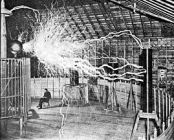
Tesla pioneered the concepts of radio, radar including X-rays. His achievements and intellect towered above the academic theorists' of the time. He was the same age as Max Planck (quantum physics) and 33 years senior to Albert Einstein. Tesla spoke of relativity theory as being meta-physics rather than true physics. "I hold that space cannot be curved, for the simple reason that it can have no properties. It might as well be said that God has properties. He has not, but only attributes and these are of our own making."
Maybe a small consolation for Tesla was that Thomas Edison 10 years his senior died first, which enabled Tesla to contribute an obituary about him in the New York Times. The legacy of these two men represents the starkest contraction about science, confronting the American economic view - 'God bestows this grace through wealth, therefore to be wealthy is to be God like.'
"There is nothing endowed with life - from man, who is enslaving the elements, to the nimblest creature - in all this world that does not sway in its turn. Whenever action is born from force, though it be infinitesimal, the cosmic balance is upset and the universal motion results. Science is but a perversion of itself unless it has as its ultimate goal the betterment of humanity." Nikola Tesla
www.tesla.org
www.tesla downunder
(1869 - 1948) Mahatma Gandhi

Mahatma Gandhi became a popularised figure of mythic proportions where little understanding of the man remains. His legacy is a memory of simplistic ideals of virtue and humility, lost to western culture, but later revitalised by Martin Luther King who restated these ideals as dreams. Mahatma and King died violently.
Many years earlier J Krishnamurti a revered spiritual teacher at the time, warned Gandhi to stop threatening to commit suicide by fasting himself to death over the civil violence during the partition of India and Pakistan, as this would only serve to make the problem worse. "Imposing order upon disorder creates further disorder, whereas understanding disorder dissolves disorder." J Krishnamurti saw Gandhi's ideals of blind virtue and childish simplicity as not only unrealistic but dangerous in a modern world of increasing complexity and disorder. Passive resistance against an agreeable British empire may have assisted India gaining a speedier independence, but passive resistance against Nazi Germany or Stalin would have resulted in a one-way ticket to a concentration camp.
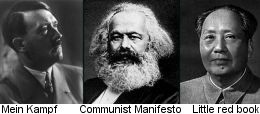
Identifying with simplistic ideals in religion, politics, law and commerce separated from art, music and science leads to extremes of polarised behaviour as seen in the world today. Many of these simplistic ideals evolved from the period in which Gandhi lived. He identified with the polarity of virtue, reflecting the contradiction of innocence. Innocence in western culture represents ignorance, whereas in eastern culture innocence represents the intelligence to let go of the past.
Gurdjieff
Bertrand Russell
Rudolf Steiner
George Bernard Shaw
are among many writers and observers caught in the contradictions between the various philosophies of idealism at the time. Also essential reading for those studying the political and social problems of today is
Mein Kampf
The Communist Manifesto
The little Red book.
Gandhi's reflection in pop culture today is identified with projected ideals for those who seek spiritual escape, by using his name to identify themselves with his values. However, as long as this does not include celibacy, weaving, not eating meat, giving to the poor, or standing in the way of military activities for stealing another's oil.
(1875 - 1961) CG Jung

Science is divided into two fundamental categories. General science is defined by mathematical theory and proof based on the physical elements (Periodic table) and measurable energy that make up the physical universe, including biology. Philosophical or interpretive science is abstract and includes human perception, language and thinking, therefore non-provable within the rules of General science. As an example, computer software consists of 1's and 0's grouped in large patterns to represent symbols that can only be understood by human interpretation.
The large volume of works published under Jung's name provided a new form of interpretive science that enabled human consciousness to be viewed at a collective level. The Jung material parallels General science by providing a structured complexity that requires a commitment of study to master the basics. This inclusion for structural complexity is the primary difference between Jungian Analytical psychology and traditional simplistic psychology.
Who was Carl Jung? His father was a parson from a poor Swiss rural background, while his mother came from a wealthy family. History states she was a depressive eccentric who was sometimes institutionalised. She had four children of which 3 died leaving Carl as the surviving child who became neurotically divided between the extremes of polarised parents. Jung later reflected that in childhood he experienced himself as two different people. One person behaved neurotically caught within mysterious symbolic behaviour and thoughts, whereas the other was able to independently observe. Understanding polarisation within consciousness and the problems it causes became the foundation of his life's work. Jung's Analytical psychology and Depth psychology including mythology is described in the subjects section of this site.
The Jung myth
Jung studied psychiatric medicine and become an advocate of Sigmund Freud 20 yrs his senior. Jung later developed a more intellectual revision of psychological analysis. His break from Freud was not because of differing or competing ideologies but the failure of the Freudian model to allow for greater complexity. However, the real story is not this simple. In the industrial era, so called 'real' men drove steam engines and built bridges, whereas women remained at home to cook, manage children and relationships, therefore psychology was seen as a woman's domain. Many men viewed characters similar to Freud and Jung as feminised and regarded them with suspicion due to their vanity and pedantic bitchiness over internal disagreements with trivial issues.
Jung similar to his father married a wealthy woman Emma Rauschenbach who supported him financially. However, Emma had independent passion with an exceptional skill for psycho-analytical research. Jung's involvement with female clients, blurred the distinction between collaborative research and personal desire, in a time when ethical standards were not in place. Emma undoubtedly had difficulty with her husband's desire to live openly in a polygamous context. One can only imagine how her eyes must have rolled as he tried to justify the need to express his Anima for scientific research. Even today with modern ethical standards, the question of analyst client relationships remains a problem that continues to haunt the psychiatric profession.
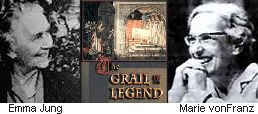
Most women Jung professionally associated with did not cross this boundary. Educated women of this era were particularly good at solving intellectual puzzles, particularly in reference to decoding mythology. Years were to pass before women's names were accepted in scientific publications. But, the failure of acknowledgment for those who contributed to the research under the Jung name has cast an unnecessary shadow over this great volume of work. Shadow is also a term used in Jungian psychology.
The Grail Legend written by Emma Jung and Marie von Franz is an excellent example of psycho-analytical detective work that decodes the religious mythology behind The Holy Grail and The Holy Trinity. Man and His Symbols was the last book to appear in Jung's name. A question asked of Carl Jung before he died - "Will the world ever be at peace?" He answered "Only when each person has done their inner work" CG Jung.
(1879 - 1955) Albert Einstein

The name and image of Einstein as E=MC² represents a vast body of work by many scientists in an attempt to understand the universe from a relative and quantum perspective. During the industrial era, knowing the exact time became an obsession. Correct time enables us to know exactly where we are in latitude and longitude, and time is essential for synchronising the generation of electrical power. A small discrepancy within a fraction of a milli-second can be disastrous. However, the average person's obsession with time is knowing that the train will appear at the station exactly as the second hand passed through zero, a second either way can result in emotional distress.
Enslavement to time under-pins our industrial work ethic and the only way to be free of enslavement is to understand it. Watch-making was a highly skilled and honoured craft and various inventions for improving mechanical clocks with tiny gears with precision balanced springs filled the patent office where Albert worked as a young man. The theory of relative time was born from Albert's imagination while sitting in a tram travelling at the speed of light, 300,000,000 meters per second.
The question behind relativity is that observations only exist within the limits of one's mind, which results in a known paradox of imagined analysis, The observer is the observed . J Krishnamurti (also listed on this page) a spiritual teacher conversant with science, helped many scientists resolve the observation paradox, by clarifying the difference between imagined belief and actuality.
Relativity also allows us to see the magnificence of our own in-significance, and without humour we could not have a sense of perspective. In an infinite universe there is no way of knowing where we are, or going, or how fast, or in which direction. Everything we perceive is relative only to our imagined position. Simply this; at the speed of light there is no time, therefore distance ceases to exist, everything including the entire universe reduces to a single point of zero magnitude.
 Below the speed of light, time and distance come into existence. There are hundreds of billions of stars in each galaxy, and there are infinitely more galaxies than grains of sand on the earth, which temporally supports
7,000,000,000+
human beings and their silly beliefs of self-importance, plus Gods fabricated in their own image.
Below the speed of light, time and distance come into existence. There are hundreds of billions of stars in each galaxy, and there are infinitely more galaxies than grains of sand on the earth, which temporally supports
7,000,000,000+
human beings and their silly beliefs of self-importance, plus Gods fabricated in their own image.
A quaint B grade movie I.Q. written by Andy Breckman staring Walter Matthau as Einstein, has a cleverly written scene of Albert and a colleague playing tennis discussing Relativity and the concept of time, existing only as words, whereas in reality, the love and relationships we have with each other is the only true meaning of our existence.
(1889 - 1977) Charlie Chaplin

Charles Spencer Chaplin was an intellectual artist of the silent movie era who created a comic character devoid of individual identity and self-importance that captured the attention of the world. Many historians have grappled with the extraordinary co-incidence of Charles Chaplin and Adolf Hitler being born within a few days of each other, later becoming polarised reflections each one observing and studying the other. Chaplin and Hitler were among the first to use the influential power of modern communication mediums on society.
Humanity's greatest achievement may have been unfolding the periodic table, but the greatest influence on humanity has been refrigeration and amplified sound. Without refrigeration, world trade could not have readily evolved. Without amplified sound there could not have been a 3rd Reich. Fascist ideology existed in all cultures throughout history and was the justification for western economic dependency on slavery, including the annihilation of indigenous cultures.
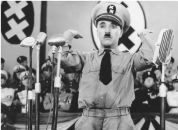 With masterful film making coupled with recorded and amplified sound, Charles Chaplin almost single handled diffused the resurgence of Fascist ideology that was beginning to consume the industrialised world. He exposed Fascism for what it is - a tragic ancient comic ideology based on extreme self-righteousness and delusional moral superiority. Many great chefs have stated "Fascism belongs in the kitchen - not in politics"
The Great Dictator
With masterful film making coupled with recorded and amplified sound, Charles Chaplin almost single handled diffused the resurgence of Fascist ideology that was beginning to consume the industrialised world. He exposed Fascism for what it is - a tragic ancient comic ideology based on extreme self-righteousness and delusional moral superiority. Many great chefs have stated "Fascism belongs in the kitchen - not in politics"
The Great Dictator
Proper-gander
"Proper-gander is the Achilles heel of the educated man" is one of many challenging views stated by Marshall McLuhan (1911 - 1980) a remarkable social philosopher who gave a detailed account of the effect of modern communication mediums on human consciousness. Mass literacy with superficial education creates a paradox that makes us susceptible to ideas as being replacements for reality, hereby distorting our relationships with each other and the environment.
 McLuhan also described that the primary cause of terrorism resulted from people forcibly dispossessed of self-identity, that when given no option will become violent as a means to regain their identity as a right to exist. McLuhan coined the phrase
The medium is the message which evoked a way of understanding that was counter intuitive and disturbing if we refuse to be aware of the consuming addictive effect of mass media, particularly television. "You think communications mediums are an extension of ourselves, but they consume your self-identity, and without understanding it, you are simply a part of it."
McLuhan also described that the primary cause of terrorism resulted from people forcibly dispossessed of self-identity, that when given no option will become violent as a means to regain their identity as a right to exist. McLuhan coined the phrase
The medium is the message which evoked a way of understanding that was counter intuitive and disturbing if we refuse to be aware of the consuming addictive effect of mass media, particularly television. "You think communications mediums are an extension of ourselves, but they consume your self-identity, and without understanding it, you are simply a part of it."
McLuhan's views were humorously demonstrated on Halloween night October 30, 1938.
Orson Welles
performed a 1-hour
radio
adaptation of the H.G. Wells novel
War of the Worlds.
Within 30 minutes outbreaks of mass hysteria occurred throughout the US, as many listeners believed a Martian invasion was actually happening.
 Early organised crime bosses were known to have dressed and imitated Hollywood characterisation of themselves on the big screen. By the mid 1960s all the world's political systems were transformed by mass media. The traditional belief that art imitated life could now be looked at in both ways.
Early organised crime bosses were known to have dressed and imitated Hollywood characterisation of themselves on the big screen. By the mid 1960s all the world's political systems were transformed by mass media. The traditional belief that art imitated life could now be looked at in both ways.
Fascist ideology cloaks itself in nationalistic identity, which in the words of J Krishnamurti "is the cause of all wars". The individual act that gives rise to Fascism is when we choose to be right rather than choose to be be happy. The Chaplin legacy has continued with modern artists, film and documentary makers who satirise social, religious and political absurdities, the Simpson's and South Park are among many examples.
(1895 - 1986) Jiddu Krishnamurti "Truth is a pathless land"

For more than a thousand years many religious teachings predicted the coming of a new world teacher (Christ re-incarnate) that would challenge humanity so deeply that all previous religious beliefs would cease to have meaning. The Theosophical Society established in 1875 came to represent the knowledge and wisdom of all religions, and assumed responsibility to find and nurture the child born to be this new world teacher. Theosophy loosely translated means 'Gods wisdom'. It's hard to imagine why any religious group would have wished this prediction to occur, but on 12th May 1895 J Krishnamurti was born. The paradox that unfolded was one of the epic stories of the 20th century and a metaphor to be careful of what we wish for.
Through questionable attainment of a few young boys from around the world the Theosophical Society attempted to groom and select the best one for their purpose. But, as the years passed all failed the test of celibacy leaving the slow and sickly Jiddu Krishnamurti as the remaining contender. Through a process of subtle blackmail, young Krishnamurti obediently complied with the facade until a betrayal involving his brother's death (Nitya) in November 1925 resulted in a temporary emotional breakdown.
Now awakened, Krishnamurti developed a scientific intellect with linguistic precision that became focused on understanding the psychological workings and contradictions of the human mind. In 1929 nearly 4 years after his brother's death, J.Krishnamurti publicly denounced all organised religions and boldly confronted the problems of contemporary society. He was extremely critical of religious exploitation and absurdity of blind faith, especially the misguided Buddhist rituals, openly challenging their contradictions including the Theosophical society that created and exploited him.
From his vast knowledge of religious faiths, practices and beliefs, Krishnamurti stood outside and beyond them all. Academics of theology, philosophy and psychology, Presidents, Kings, Queens, Popes, Bishops including Mahatma Gandhi and the Dalai Lama, all feared and revered his intellect. All understood and respected that J Krishnamurti was top dog, although a few including the Pope would not openly admit it. Many intellectual giants in arts, literature and science throughout the world accepted him as one of their peers. Resolving the paradox "The observer is the observed" was Krishnamurti's contribution to assisting scientists studying Quantum mechanics and the universe. Observing nature or ourselves requires us to understand what it is that is doing the observing.
J Krishnamurti's quest was to "set Man absolutely, unconditionally free from his conditioning, selfishness and sorrow". However, this could have been anyone of us, that through circumstance, found ourselves in the same situation, which is the paradox behind this story. Further background and teachings of J Krishnamurti is in the subjects section of this site. → The World of J Krishnamurti
(1897 - 1985) Charles Bliss 'Mr. Symbol Man'
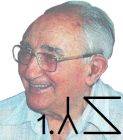
It is impossible for most of us to comprehend the horror of a concentration camp. Among those who survived were the few who committed their lives to a quest for a united humanity. The legacy of Charles and Claire Bliss is a magnificent creation of universal symbolic writing system.
From the limited biographical information on Charles Bliss, it is known that he grew up in an impoverished region of Hapsburg, which bordered many countries including Russia. His mother gave him the love poetry and literature; his father taught him the laws of nature and science. However, the symbols of chemistry and electric circuits captured his imagination.
In the last years of the old Austro-Hungarian Empire, young Charles witnessed refugees crowding over the border with tales of bloodshed and murder; different nationalities hating each other (as he described) only because they spoke and thought in different languages. At school, he rebelled against the unruly rules of languages and could not understand why children should be tortured with such absurdities as relative, indefinite, intensive and reflective or reciprocal pronouns. He became a research chemist in an electronics company and progressed to chief of the patent department.
 Here he realised that the babble of scientific publications was one of the primary handicaps to scientific research.
Tower of Babel
Here he realised that the babble of scientific publications was one of the primary handicaps to scientific research.
Tower of Babel
In 1938 Germany invades Austria and Charles was sent to Dachau concentration camp. His wife Clare fought bravely to have him released, and he had to leave Germany immediately. Through the entanglement of war they set out for Shanghai. Clair made her way alone through Turkey Siberia and Manchuria. Charles escaped to England then to Canada, across the Pacific to Japan. On Christmas Eve 1940 after three years of separation, they were together again, but Shanghai soon became occupied by the Japanese.
While being contained in the Hongkew ghetto Charles and Clair came across the works of Professor Basil Hall Chamberlain who stated that "Ideographic writing will surely achieve the final victory over phonetic writing." Inspired by these works which were also supported by many educated Chinese and Europeans living in East Asia, Charles and Clair set out to complete the universal symbolic writing system during the blacked-out nights of war-time Shanghai.
Their later work included the principles of Gottfried Leibnitz a 1700s mathematician and philosopher who invented calculus (independently of Newton) and binary notation which became the foundation of modern computer architecture. But for 300 years academics scoffed at Leibnitz' idea of a universal symbolic writing system. Charles was also about experience the wrath of academics.
In 1946 Charles and Clair now their senior years, migrated to Australia. Claire distributed their work to possibly every university in the world, which was met with apathy and rejection. Academics in linguistics whose identities were attached to semantics and interpretations had little interest in reflecting on Fascist ideology and its emotive illogical use of language. "You ought to be dead first, Mr. Bliss. Only then will we exhume you, extol you and exploit you." The Cold War resulted in a resurgence of funding for Academics in linguistics as the need for politically driven ideological rhetoric and semantics increased. Also the onslaught of capitalism controlled only by the market where words and descriptions are manipulated to attain greater meaning than the described.
Having been a victim of the Nazis, Charles witnessed first-hand how Hitler and his minions fooled Germany, an intelligent and literate nation with words that cannot be pictured, words that only exist as Fascist evaluations, inferior, subhuman, pure race, superiority, honour etc. Any development in linguistics that strives to achieve pragmatic and logical communication was and is still resisted.
Charles and Clair were in an un-winnable situation. Also the stigma of being refugees was used against them and Charles had to work as a labourer. Clair died 1961 heart-broken, Charles temporally beaten and distraught managed to regain his fighting spirit, this time to secure global copyright to prevent Corporations and Academics plagiarising their work.
However, there were many courageous Academics including Bertrand Russell who stood by Charles and Clair, openly acknowledging their work and the benefit it would bring to the world. In 1969 Charles was nominated for the Nobel peace prize but rejected it on the grounds that it was also being offered to those whose principles were the antithesis of everything he believed in. In 1976, Charles was made a Member of the 'Order of Australia' and in 1979 became an Honorary Fellow in Linguistics at the Australian National University. Six years later 1985 Charles Bliss died age 88, his dream unfulfilled.
The Bliss symbolic writing system will eventually be adopted by the world, this time it will be driven by advancements in computer technology and the need for a singular global method of communication, it is only a matter of when. There can be no better words to describe the gift Charles and Clair Bliss has given to the future of humanity than the ones written by
John Lennon.

Imagine there's no countries
It isn't hard to do
Nothing to kill or die for
And no religion too
Imagine all the people
Living life in peace
You may say that I'm a dreamer
But I'm not the only one
I hope someday you'll join us
And the world will be as one
Authors Note: At age 10, I had been severely injured by an insane German ex Panzer commander who 12yrs earlier along with many of his comrades deserted from the Eastern Front and was drifting aimlessly in the world. I lost the ability to read, write and speak, but had not lost the understanding for arithmetic or mathematical symbols. Being isolated in an aboriginal community near Darwin I had no access to schooling for 2 years, except for a discarded high school geometry text book. Captivated by the symbols of geometry and its logic I managed to regain what had been lost, but in a different way. The honouring of Charles Bliss and his work has been directly influenced by this experience.
Summary
Imagine all the people listed on this page discussing who they would honour most among them. This question is not about who we would select in reference to our values, but who would they select to represent a value greater than themselves.
By reading through the list again we may see a clue. All represented selflessness in varying degrees and were unquestionably skilled in their craft. Undoubtedly each one would acknowledge that their life was mostly dictated by circumstance and the honouring of their name had been chosen by history to represent the vast body of accomplishment by countless thousands in their respective fields. It also would be unlikely that anyone would claim that the world be any different if either one had not existed.

Nikola Tesla along with many others transformed the world from the industrial era into the modern technological era of today. He conceived the AC electric generation system for the world to the finest detail. It has been argued that this accomplishment alone was possibly 50 years ahead of its time. Many of the Tesla Society's today are perplexed by a single question. How could a single mind conceive electro-magnetic energy in 4 dimensions a function of nature that had not been previously understood or imagined. The Egg of Columbus
A vast realm of the human mind is occupied with an identity of a self (separate from awareness) that adopts and maintains an imagined reality of beliefs, judgements, fears and anxiety which often becomes the primary purpose for our thoughts and actions. A mind that is not pre-occupied with a concept of a self, is a mind that can freely evolve absorbing all it perceives without the notion of separation between the observer and the observed; a mind at one with the infinite universe.
Imagine the beauty of a selfless world.